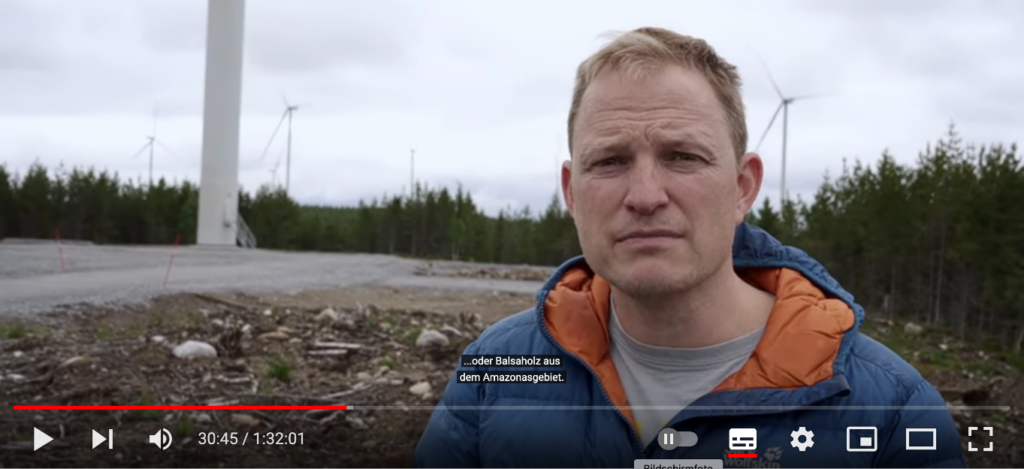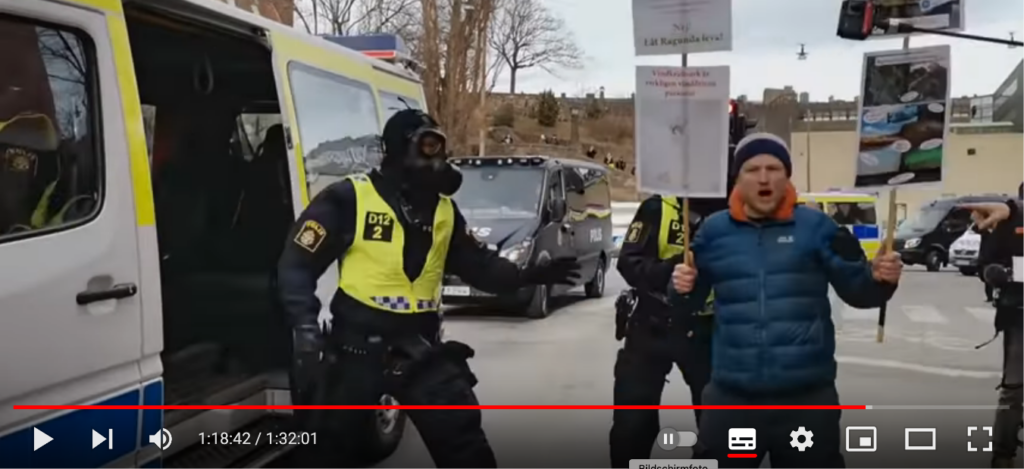Headwind 21, a documentary review
(Translated by P. Gosselin)
Headwind “21” is a film by Dutchman Marijn Poels. The documentary premiered on YouTube on September 23, 2021. We reported briefly on the film before.
Poels accompanies ex-consultant and ex-banker, Alex Pohl, through various stages in the film. Pohl says he has dealt with different sides of the energy industries in the past. Both with fossil fuel companies and projects and with renewables, for which he worked 20 years ago. His initial enthusiasm for green power sources, especially wind, has since faded away. He even talks about a corrupt system and shows this in the documentary.
Pohl leads Poels to his adopted home in Sweden, where wind turbines are now being built in unspoiled nature. The former consultant talks to various representatives of the administration and companies, but also to residents of wind farms. Pohl does not always get answers, but sometimes the answers are sobering, because some of the people involved are not aware of the consequences of their actions.

Ex consultant Alex Pohl. Screenshot Headwind 21.
Pohl criticizes the land consumption for wind power, especially the cutting of forests by the building of access roads. He also addresses the issue of consumption of resources for the production of wind turbines.
An interesting moment in the documentary occurs when he finds out that the electricity from a new wind farm is needed for a new Google data center in Finland. Sweden, Poels says, would have met its 2030 climate goals already by 2018. Among other things, the country has a lot of hydropower, plants that in some cases have been in operation since the 1930s. So in Sweden, forests are being destroyed so that Google can have a good green conscience in Finland.
Poels also meets Greta Thunberg in Stockholm and interviews her. After that, the documentary takes a dramatic turn. Pohl does what Greta advised him to do, namely to create attention. To do this, he makes posters on which he denounces various things, including investor Infravia from France. The ex-consultant explains beforehand which economic connections exist in the matter of wind power. But, Pohl is allowed to learn that there are good and bad demonstrations. He is led away by several policemen wearing gas masks (!) and taken away in a car.

Screenshot Headwind 21.
The film ends with a depressing phone call. The Swedish police contact Pohl, three months after his arrest. They want to question him. He is accused of a crime called “evasive resistance”. Whether this refers to his resistance during the arrest is not really known. Nor why he was taken away in the first place. Pohl is not even informed of his rights, which he makes clear to the police officer several times. He breaks off the phone call and offers to travel to Stockholm for questioning. The documentary leaves open whether this questioning still took place. This is certainly one of the weaknesses of the documentary, because it leaves the viewer somewhat perplexed.





Everybody should read this website which tells the truth about our “renewable energy” !!!
https://stopthesethings.com
There is something very wrong in the world, and it is not climate.
It is even worse in Sweden. Like many other countries in Europe, they are decommissioning nuclear power, with six out of twelve existing reactors now shut down. Also, a challenge by “environmental” groups, under a loophole in current environmental laws decided that over 6,000 existing small dams had been granted construction permits on improper grounds, mostly in the south of the country, and in many cases going back over a hundred years from the present. This includes many small hydro-electric plants as well as dams for water management and irrigation. The ruling requires the dam permits to be re-evaluated under current rules. Enter the EU. Current EU directives all dam permits to be evaluated on the basis of the environmental site conditions that exist prior to the construction of the dams. This has been interpreted to mean that the affected dams must first be demolished before the permits can be re-evaluated. This represents the potential loss of much of the hydro-electric generation in an area of Sweden that is far from the large scale generation sites, and that is already suffering from steeply rising electricity prices and looming shortages.
The Greens and the EU together are the anti-Midas. Everything they touch turns to shit.
A muddled documentary and the guy was a fan of , Greta!
“This is certainly one of the weaknesses of the documentary, because it leaves the viewer somewhat perplexed.”
Perhaps feeling perplexed was intended. Should citizens feel complacent with the situation we’re in?
The level of awareness of corruption that a banker, who participated in enabling the wind industry and government complicity has exposed in this documentary, ought to leave viewers, especially those who have had no direct experience with these massive turbines ruining their living environment, feeling very unsettled.
In answer to the negative comments, I would say that the main message is Grettas : raise awareness. Only we, the people can make a difference. Employees in these industries, purchasers in stores and on line. There is a danger of feeling helpless but we do have power. This guy is doing what he does best. What do you do best? Use that.